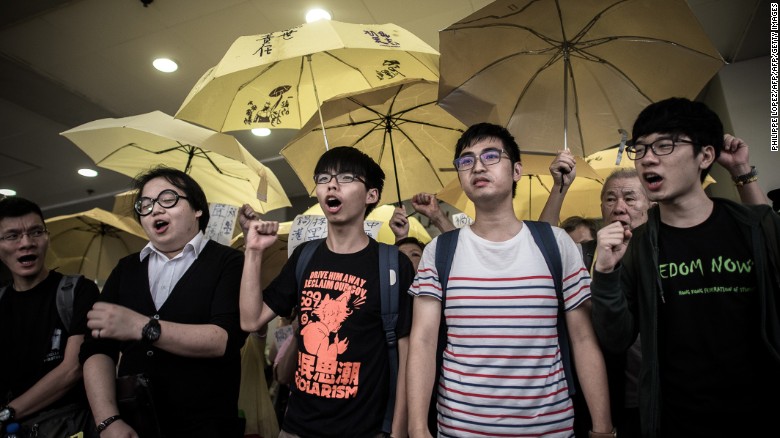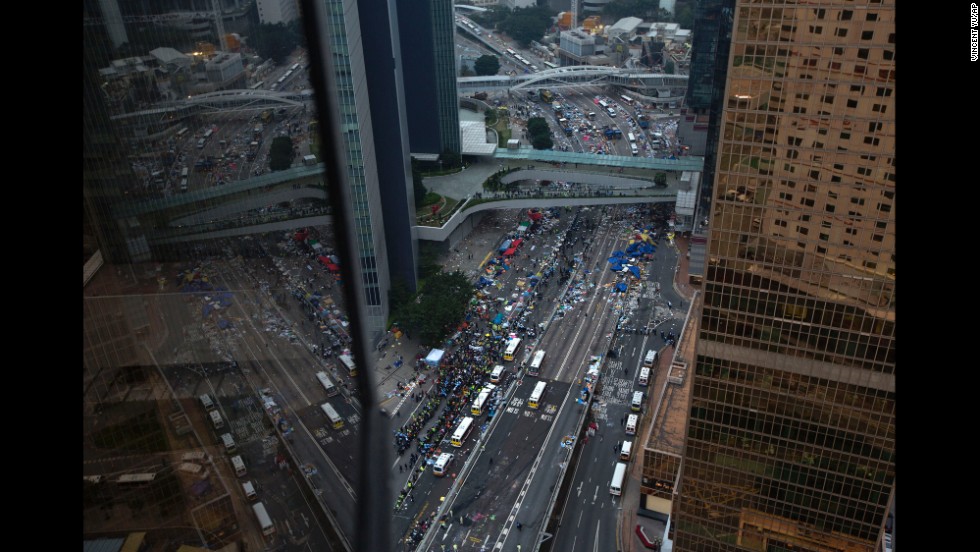Hong Kong's 'Umbrella' protest: One year on, what has changed?
It was an unexpected outburst of violence that shocked Hong Kong and the world.
One year ago on Monday, police in riot gear moved in on peaceful pro-democracy protesters, using tear gas to disperse the crowds.
From these clashes emerged the "Umbrella Movement," named for the umbrellas the protesters used to shield themselves from the tear gas and pepper spray.
For 79 days, thousands of protesters occupied Hong Kong's financial district and elsewhere to demand true universal suffrage -- one person, one vote, without the interference of Beijing.
It was the biggest political challenge to Beijing since the 1989 Tiananmen Square protests. But after all the passion and the protest, what has the Umbrella Movement actually achieved?
After public opinion turned, the demonstrators were cleared off the streets.
Hong Kong's embattled leader, C.Y. Leung, remains in charge.
And while Democrats rejected a Beijing-backed proposal for limited democracy, the"no" vote maintained the status quo.
Where are the protesters now?
The Umbrella Movement's call for democracy was ultimately denied, and yet student protest leaders still believe it was not all for nothing.
I think everyone is preparing, waiting for the right reasons to take to the streets again.
Nathan Law, student protester
"When I look back in the past year, I am not pessimistic nor do I feel bad about it when I see how things have calmed down," says student protest leader Nathan Law.
"I think everyone is preparing, waiting for the right reasons to take to the streets again."
In the early days of the Umbrella Movement, university student Glacier Kwong posted an online appeal to "Please Help Hong Kong." The clip quickly went viral, posting over a million views.
Like Law, she too refuses to put her activism on hold.
"I am still fighting for universal suffrage," says Kwong. "I'm also focusing on Internet issues like the 'right to be forgotten' and the ordinance used by police to crack down on people using the Internet to organize protests."
Joshua Wong, the teenage face of the pro-democracy movement, has shifted his focus to 2047, when Hong Kong's semi-autonomous status expires, leaving its future an open question.
Last week, Wong took his message beyond Hong Kong to Washington D.C. while Chinese President Xi Jinping was visiting the White House.

Student leader: We must continue to fight
Protesters are fighting charges
Since the handover from Britain in 1997, Hong Kong has been governed under China's principle of "one country, two systems" -- giving it rights and freedom unseen in the mainland.
Over the years, Hong Kong protesters have been exercising those rights, successfully challenging a proposed introduction of "patriotic" education in the local curriculum.
After last year's failed demonstrations for true universal suffrage, most of the protesters returned to their classes or jobs. But life is not the same for many of them.
Protest leaders, including Joshua Wong and Nathan Law, are involved in legal proceedings on charges of unlawful assembly.
There are also growing concerns that Beijing is increasingly asserting its authority over Hong Kong, and many young activists dare not travel into mainland China.
Some have taken up other causes
Despite the pressure and scrutiny, Hong Kong's student protesters say they are still pushing for change, but in different areas.
"Once academic freedom is jeopardized, political power can control our thoughts and it will be very hard to fight for democracy at that point -- so we are working on fighting for academic freedom," said Law.
While Law focuses on maintaining academic freedom, and Kwong directs her efforts toward Internet activism, other student protesters are pursuing additional causes.
"The protest groups did split up a bit, but some are now focusing on more local problems like parallel trading," said Kwong, referring to Chinese traders who cross into Hong Kong for cheaper goods.
Democracy remains elusive in this Chinese city, but the Umbrella Movement did at least achieve one thing.
It brought about the political awakening of an entire generation, many of whom won't give up their fight to determine their political fate.
News Courtesy: www.cnn.com











